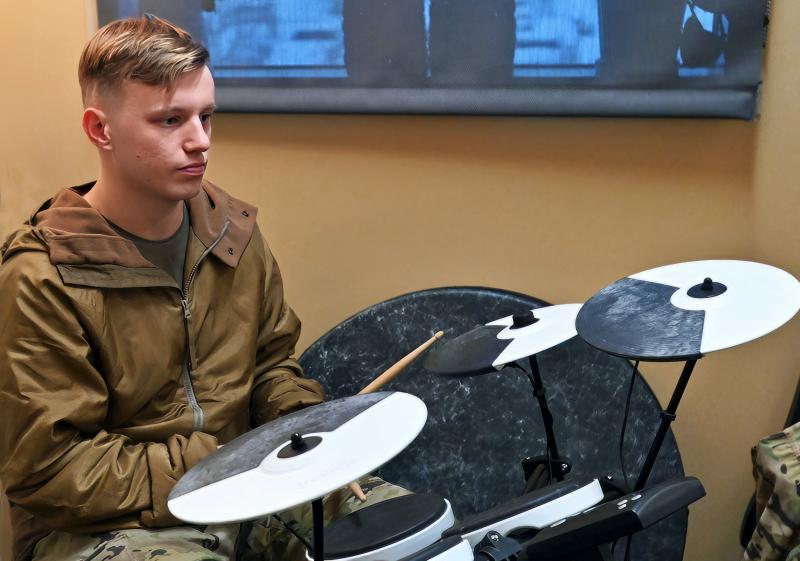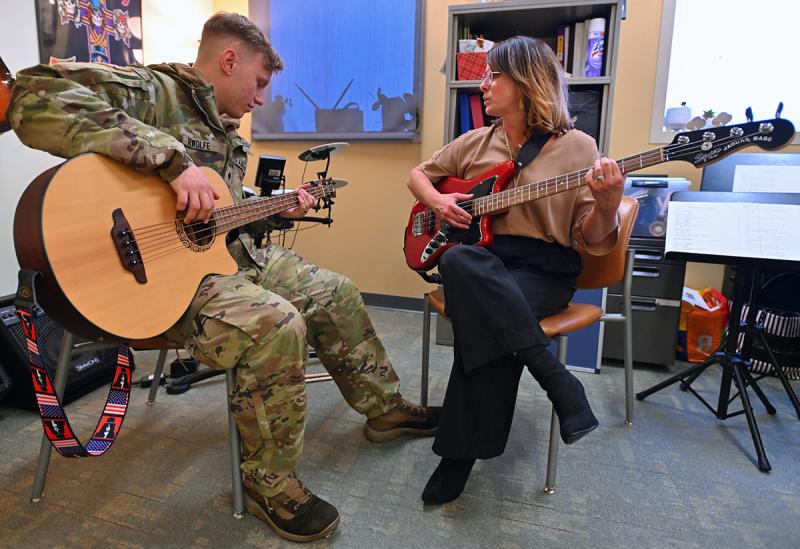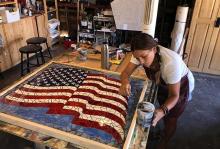A Soldier’s Artful Life: A Conversation with SPC Ryan P. DeWolfe

SPC Ryan P. DeWolfe plays an electronic drum set during a music therapy jam group session at Joint Base Elmendorf-Richardson in Anchorage, Alaska. Army photo/John Pennell
Specialist Ryan P. DeWolfe is a fifth-generation soldier and second-generation paratrooper. He was raised in a military family; his father is Active Duty in the Army. SPC DeWolfe has also had an artful life in music. “My dad wanted to be a rock star, so we always had a home studio,” he said. “I've been playing the drums since I was six years old. My father played guitar growing up, and we would play music together all the time. We also wrote music together.”
SPC DeWolfe graduated high school early and enlisted in the Army, initially serving as an infantryman before transitioning to electromagnetic warfare operations. He is currently stationed at Joint Base Elmendorf-Richardson (JBER) in Alaska. Shortly after arriving in Alaska as an infantryman, he sustained a head injury. The hospital referred him to the JBER 673rd Medical Group Traumatic Brain Injury (TBI) Clinic. There, he worked with Creative Forces music therapist Danielle Vetro Kalseth, who provides music therapy services and treats active-duty service members, veterans, and dependents. Services include one-on-one and group sessions, including a jam band group that performs in the Anchorage community.
“Music healed me. Nothing else worked. The medicines, the variety of treatments, they really didn't help,” he explained. “Music was the one thing that was really there for me. When nothing worked, and nobody was there, music and Danielle were there.”
He encourages fellow service members to explore the benefits of music therapy. “Even if you don't have a music therapy program open to you, doing whatever art you’re interested in ... photography, painting, drawing, or music, helps in so many ways,” he said. “Those activities are an expression of human emotions. There is no better way to express yourself than through the arts. I hope anybody who's having a hard time recovering from a TBI, or any other head injury, tries music and art to recover.”

SPC Ryan P. DeWolfe works with Danielle Vetro Kalseth, Music Therapist, HJF, in support of Creative Forces at Joint Base Elmendorf-Richardson (JBER) in Anchorage, Alaska. Army photo/John Pennell
NEA: Tell me about your life in music. You mentioned your background growing up, being a part of a military family, and moving around, but the drums were also a part of your experience growing up.
SPC RYAN P. DEWOLFE: We had a lot of analog equipment that my dad had from back in the day. I had the privilege to be able to play around with the recording equipment. I was able to not just play the drums but was also exposed to recording them and recording guitars and other instruments. I learned more than just the simple technique of using a direct line in to recording equipment. Once I was in middle school, I expressed an interest in learning how to produce music digitally. For Christmas in the sixth or seventh grade, my father bought me FL Studio, software I could use to produce music. I eventually developed a niche for producing music. In high school, I got signed to a local record label, and they would put my music in local stores. I still produce music.
NEA: Can you share what your experience was like working with music therapist Danielle Vetro Kalseth?
SPC DEWOLFE: In my first one-on-one appointment with Danielle, I wanted to try the guitar because I had never played one before. I play the drums, and I taught myself the bass. I thought, “What better way to heal my head than learning something new?” After one appointment, I caught on quickly. Toward the end of the appointment, I picked up a bass and played a song that I learned on my own. Danielle said, “You should play the bass and come to our jam group. I think you're already a musician. I don't think you need these one-on-one appointments. I think you'll benefit more from playing with a group of people.”
It took some convincing for me to join the jam group because I hadn't played with other people since my high school band. I was rusty, especially after a head injury. But I gave in, went to one of the jam group sessions, and played the bass. We played a show at a VA hospital during my first week or two in the group. I got to play with the Ninth Army Band during that show. I had recently just started learning the bass. I learned the bassline to “Sweet Child of Mine,” which is pretty challenging. Before the show, one of the Ninth Army band guys asked, “Are you going to be able to play it (“Sweet Child of Mine”)?” I felt determined to be able to play it when we did the show. I spent the entire day before the show perfecting the intro bassline to that song. I was very excited. It was the first time I had been excited for something in quite a while since my head injury.
NEA: You play bass, drums, and guitar—all instruments in the rhythm section of a band. What do you take away from being a member of a rhythm section?
SPC DEWOLFE: The rhythm keeps the band on track and helps things progress. If the drums are off, then everyone in the band's going to be off. The guitar player can kind of mess up and recover. But if the drummer is off-count on a couple of bass drum hits or snare hits, everyone is going to notice. And it’s the same with the bass. It can be daunting sometimes because those mess-ups, especially in a group session, are very, very obvious. The best thing you can do is learn to just face forward and plow through it and try to learn and not get in your head too much. People who do that and practice will excel at the drums, the bass, or anything else in the rhythm section.
NEA: The jam group is active in performing in the Anchorage community, including Community Cafés hosted by the Anchorage Concert Association. Tell me about the experience at these events and what the value is for the community of service members and veterans who participate.
SPC DEWOLFE: It’s great for the people in the jam group to practice their music skills and see how they will be used in a performance. When you're practicing, it's a different environment than when you're playing in front of people. Plus, they're fun. It gives us a goal in the group session: We need to learn this and this song. We need to be able to play this well enough to play it in front of people. We need to have it ready by this date, especially because everyone in the group is a veteran or active-duty service member. In the military, we work in the same way. There's a hit line, there's a hit time. We need to have this and this done by that time.
Participating in the Community Cafés helps with performing, and it really helps with —not freezing up. When I had my head injury, public speaking and talking in front of people became way harder. Participating in the community events and jam group not only helped with that but also made me see just how much I was improving in my instrument and ability to communicate, which gave me the courage and motivation to keep going.
NEA: Tell me about your recovery journey and return to Active Duty.
SPC DEWOLFE: I went to the TBI clinic every day. I did art therapy and music therapy to help figure out what might help me heal. The one that really clicked with me was music therapy. Things came full circle back to music in my life. I had a hard time playing music and playing instruments after my head injury. Everything became really hard, especially with the drums. Things like limb independence, being able to move all four of your limbs independently, was very difficult.
They tried to medically discharge me from the Army at first. I was slowly recovering. Once I started to attend music therapy, the healing sped up a lot, and it's the only reason why I was able to recover with enough time to fight that medical discharge and stay in the Army. Going to music therapy every week consistently and working with Danielle and others was the only reason I was able to go in front of a neurologist and pass the medical exams they needed me to pass in order to stay in the Army. I'm deeply grateful to Danielle and the rest of the team for giving me the privilege and the option to be able to fight to stay in the Army and win. I intend to stay in the Army for a good while.
NEA: What advice would you give to other active-duty service members or veterans about the benefits of music therapy?
SPC DEWOLFE: A lot of people will hear music therapy at first and think, “Well, my guys at work need me. I don't need to go play an instrument for an hour.” It's far more than that. Music, throughout human history, has had medicinal properties. I strongly recommend anybody to at least give it one go. Even if you know nothing about music [or] you've never played an instrument, those are the people that it's going to help the most. When you start from nothing, you can really only get better.
Music therapy helped bring joy back into my life. Jam group specifically helped me rebuild a lot of my social skills that were heavily affected by the head injury. To be honest, out of all the treatments I received for the head injury, none of them worked—medicine, occupational therapy, art therapy. Music therapy is the only one that worked. I still do it. When I have the time to do the jam group, I still participate. It's just such an incredible program. It's definitely the only reason why I was able to heal.
Learn more about Creative Forces: NEA Military Healing Arts Network.
Santina Protopapa is an arts education leader, musician, record collector, storyteller, and media maker who has been a member of the Creative Forces: NEA Military Healing Arts Network team since 2020.





